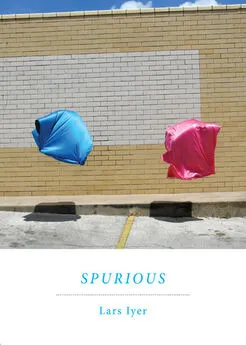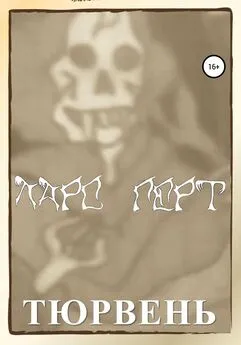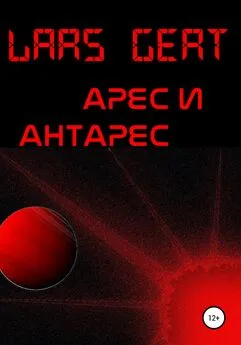Lars Iyer - Spurious
- Название:Spurious
- Автор:
- Жанр:
- Издательство:Melville House
- Год:2011
- ISBN:нет данных
- Рейтинг:
- Избранное:Добавить в избранное
-
Отзывы:
-
Ваша оценка:
Lars Iyer - Spurious краткое содержание
In a raucous debut that summons up Britain's fabled Goon Squad comedies, writer and philosopher Lars Iyer tells the story of someone very like himself with a "slightly more successful" friend and their journeys in search of more palatable literary conferences and better gin. One reason for their journeys: the narrator's home is slowly being taken over by a fungus that no one seems to know what to do about.
Before it completely swallows his house, the narrator feels compelled to solve some major philosophical questions (such as "Why?") and the meaning of his urge to write, as well as the source of the fungus… before it is too late. Or, he has to move.
Spurious - читать онлайн бесплатно полную версию (весь текст целиком)
Интервал:
Закладка:
But still I watch, I tell W. Still, nightly, I wield the heater. Is the wall drying out? Has it begun to dry out? I ask myself like a madman. Or is it a mirage, a mirage of damp? Have the spores got to me? Has the mould coated every passageway of my lungs and sent me mad? True, I have a new and persistent cough. I cough all the time — today I thought I’d lose my voice, I tell W. One day I’ll wake up mute in this flat of damp. Mute in the damp, spore-filled, choking. And one day, as I approach the walls, I’ll disappear into them, damp returning to damp.
W.’s been ill, he says. Again? Yes, again. He gets up, goes to work, and comes back to sleep, that’s all. — ‘I don’t know how Kafka got anything done. It’s terrible being ill’. I ask him whether his houseguest has gone. She has; and Sal’s still away, so his house is becoming like Howard Hughes’, he says. With bottles of urine everywhere? He hasn’t cut his hair and nails, says W. He’s like a wild man.
Has he had any thoughts from his illness? — ‘None’. Has his new book advanced any further? — ‘No’. Has he written our joint abstract? — ‘No again’. And what of my news? he asks me. I tell him of my plans, my new schemes. — ‘Every year a new stupidity! It’s all begun afresh for you, hasn’t it?’, says W. ‘What new plans do you have? Where will your idiocy lead you?’
I’m at my most idealistic at the start of the year, W. notes, whereas he’s at his most gloomy. ‘Idiocy protects you’, he says. He reminds me of my great follies in the past. — ‘Do you remember your Hindu period? Your plans to learn Sanskrit and become a scholar of Hinduism?’ And then there were my plans to learn music theory and become a scholar of music . We both marvel at them. ‘What’s it to be this year?’, says W., ‘go on, I need a laugh’.
The new year! It’s always the same! New ideas! New follies! But W. is ill, and has no plans. Bottles of urine everywhere, hair and nails uncut, scrabbling through piles of unfinished writing, he staggers through the day.
W. is ill and so am I. But W. will never believe I am as ill as he is. I haven’t moved from my sofa in three days; he hasn’t moved from his in a week. I’ve done little but watch DVDs; he hasn’t been able to muster the concentration necessary to watch a film. I’ve lost my appetite, but W. has forgotten he ever had an appetite. And above all, I’m capable of writing, I’ve lost my appetite , whereas W. hasn’t touched a keyboard for a week. Even my illnesses are affectations, W. says.
‘You don’t know what it means to be ill, night and day. Like Kafka. Like Blanchot’, says W. W.’s illness is grand, mine is petty. His draws him closer to the masters, mine only reveals how far from them I have always been. — ‘What amazes me’, says W., ‘is that they could ever write a line’. W., in his illness, can write nothing.
Colds come from China, says W. They spread west across the mountains and the steppes. It’s a tremendous journey. From China to Plymouth, but a cold’s reached him nonetheless, although he calls it a flu, since he’s always been prone to exaggeration.
W. was impressed at my recent depression. ‘It’s a sign of your seriousness’, he says, ‘or that even an idiot like you cannot escape seriousness’. These are desperate times, says W., even I must have a sense of that.
W.’s always admired my whining, ‘like a sad chimp, at the limits of its intelligence’, but my depression has taken me beyond that, hasn’t it? ‘You were silent for once’, W. says. I didn’t ring him, or respond to emails … No chatter from me: that’s when he knew things were really bad, W. says.
Of course we’re never really depressed, W. says. We know nothing about real depression. We’re men of the surface, not of the depths. What do we know of those blocks and breaks in the lives of real thinkers? What can we, who are incapable of thought, understand of what the inability to think means for a thinker? And what of real writer’s block — what understanding can we have of that terrible incapacity to write a line for those who have thoughts to set down?
We’re melancholic, that W. grants. Who wouldn’t be? Melancholic, vaguely rueful, knowing we should not be where we are, that we’ve been allowed too much, overindulged … And for what? With what result?
True thoughts pass infinitely far above us, as in the sky. They’re too far to reach, but they’re out there somewhere. Some place where we are not. Some great, wide place where thoughts are born like clouds over mountains.
It’s all our fault, isn’t it? The whole thing is our problem in some way, as though we were behind everything. Yes, we’re responsible. We’re resigned to it: we’re not just part of the problem, we are the problem.
The road is blocked — our road, everyone’s road. We should just get out of the way. But how can we get out of the way of ourselves? We should throw ourselves off the cliffs, we agree. We should get the water taxi out to Mount Batten, and then head up to the cliffs, and …
But what good would it do, our bodies prone and bloody on the rocks, seagulls pecking out our eyes? How could we apologise then? Because that’s what we ought to do — we should spend our whole lives saying nothing but sorry: sorry, sorry, sorry, and to everyone we meet. Sorry for what we’re doing, and what we’re about to do, sorry for what we’ve done … Who would be there to say that for us if we jumped from the cliffs?
The damp is moving towards the living room, I tell W. The dark armies of damp are moving towards the fresh, dry plaster of the living room. When will it breach the door frame and come through? When will it meet with the damp that’s already coming from the other room?
I’m stranded in space between the armies of damp, I tell him. Stranded, as between two high walls of the sea, parted as Moses parted them. On a strip as wide as this room, the living room, still dry, still an island in a sea of damp. And on two sides of the island, the waves are lapping. Soon they will lap over this island too, and it will have sunk beneath the ocean’s smooth surface. Or is it the two lips of a mouth that have opened, and I am the word it is trying to say? I think it’s speaking through me, a word of damp from within, in my frosty, spore-filled breath and in every line I write.
‘So what are you working on?’, says W., knowing the answer. ‘Nothing, as usual … it’s enough for you just to survive from day to day, isn’t it?’ I’m not like him, W. says, I don’t expect much from life, or from myself. — ‘How do you think you’ll be remembered? What’ll they put on your gravestone?’
‘What’s that name Hollywood directors use when they want to disclaim involvement with a film?’, W. asks me. Alan Smithee, I say. — ‘That’s how you should sign your work’, says W. ‘You’re Alan Smithee! Nothing turned out like it should, but it wasn’t your fault! It was everyone else’s fault! It was the system’s fault, for allowing you to write!’
I like to present myself as a victim, W. observes. I want a reason to whine night and day. Is W. a victim? I ask him. No, not really, he says. He doesn’t have the victim mentality that I’ve perfected. — ‘You love feeling like a victim. You like nothing better than to be persecuted’. But, I tell him, he must admit I have been a little persecuted. — ‘How?’, says W., ‘give me examples’, and when I do, he says, ‘you’re no more persecuted than I am! You’re not in the least persecuted!’
Why do I like to feel persecuted? W. muses. It’s because of my general hysteria. I’m an hysteric, W. notes, ceaselessly whining, but he likes me because of this. There’s something magnificent about my whining, he says. Sometimes it reaches a magnificent purity. — ‘You attain whining itself’, says W., ‘the pure “to whine” ’.
W. is a seer, and I am a whiner, he says. It takes a seer to discover what is eternal in my whining. — ‘It’s magnificent’, he says, ‘go on, do some whining. Whine, fat boy. Tell your story’.
Last year, on the banks of the river Tamar (—‘ah, the mighty Tamar’), W. held forth at length on the question of finding your own voice . He thinks he might have found his quite recently, he says. He’s noticed quite a change in his writing.
And what about me? W. reflects. My voice, he says to me, is like a transcendental whining. It’s amazing, he notes, just how much I whine, and how much I give myself to it. — ‘It absorbs everything you are’, said W. In many ways, he admires it, says W. He thinks it’s why he’s drawn to me.
No one should drink as quickly as I do, says W. Or as much. — ‘You drink too much!’, W exclaims. Of course, W. remembers when I barely drank at all. I wasn’t a drinker then, W. says. I lived with monks at the time, which explains a great deal.
For his part, W. is a steady drinker — a heavy drinker, but a steady one. He paces himself — he learned it from Polish drinkers, who begin slowly and continue slowly, but drink through the whole night. Visiting Poland taught W. a great lesson about drinking.
‘There comes a stage in your life when you have to drink’, W. says. ‘There’s nothing for it. The world is shit, life’s shit, and if you thought for a moment, really thought, you’d kill yourself’. W. went through a period of drinking every day, he says, just as I went through one. He had to, he says, it had all become too much for him. He learned it from me, he says, drinking through your despair.
He was a melancholy drunk, W. says, lying in front of the TV with a bottle of wine. I, on the other hand, was an exhilarated drunk, writing rubbish on the internet all night, when I wasn’t out in the pub. Of course, W. never knows when to stop drinking. He never stops until he passes out, he says. Imagine it: passed out, in front of the TV. That’s why he cut down his drinking, W. says.
I ruined my digestive system, W. remembers, that’s why I stopped drinking so much. I was continually on the verge of soiling myself, it was disgusting, says W. When he came to stay and followed my drinking regime, it was exactly the same: he was on the verge of soiling himself. He had a glimpse of the horror of my life, which was completely different from the horror of his life. — ‘Your digestion!’, he remembers. ‘What did you do to yourself?’ No one should have lived as I have, says W. He’s amazed I survived.
The damp can get no wetter in the kitchen, I tell W. The plaster comes off on my fingernails. It’s brown paste. And the smell, the terrible smell. What’s rotting? What’s behind the kitchen units?
The plaster’s to come off Monday, I tell him, and it will be the final encounter. The brick and I. Exposed brick and a man, and the great drying machines. Because the machines are coming to dry the place out. Night and day, they’ll suck the damp from the air. And the plaster will have been stripped away. And there will be nothing between the damp and me. Nothing but damp brick and I in the stripped away kitchen.
The drying company appointed by the Loss Adjuster say they have no idea of the cause of the damp, I tell W. No one understands the damp. It’s Talmudic. The damp is the enigma at the heart of everything. It draws into it the light of all explanation, all hope. The damp says: I exist , and that is all. I am that I am: so the damp. I will outlast you and outlast everything: so the damp.
Everything begins when you understand that you, and you above all, are Max Brod: this, for W., is the founding principle. That you (whoever you are) are Max Brod, and everyone else (whoever that might be) is Franz Kafka. Which is to say, you will never understand anyone else and are endlessly guilty before them, and that even with the greatest effort of loyalty, you will betray them at every turn.
Читать дальшеИнтервал:
Закладка:










